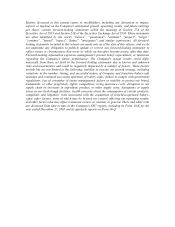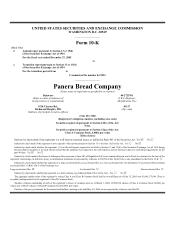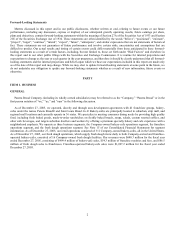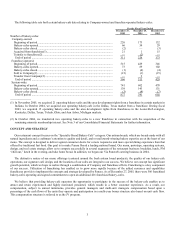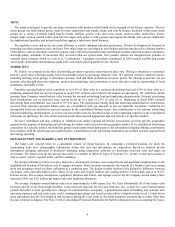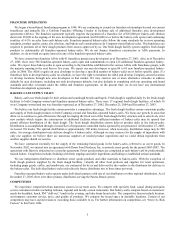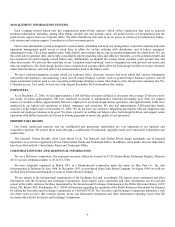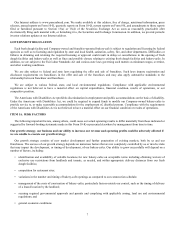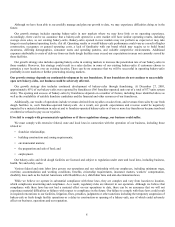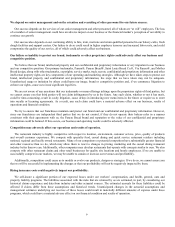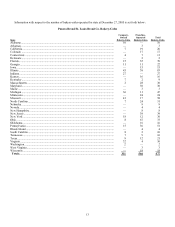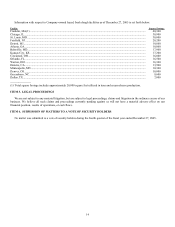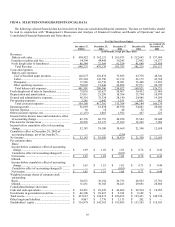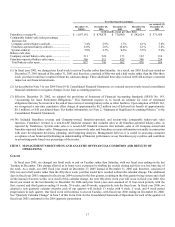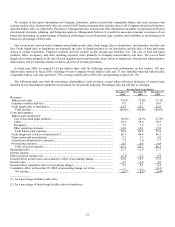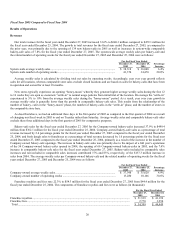Panera Bread 2005 Annual Report Download - page 16
Download and view the complete annual report
Please find page 16 of the 2005 Panera Bread annual report below. You can navigate through the pages in the report by either clicking on the pages listed below, or by using the keyword search tool below to find specific information within the annual report. 10
Additionally, the costs of insurance and medical care have risen significantly over the past few years and are expected to continue
to increase in 2006. These increases, as well as existing or potential legislation changes, such as proposals to require employers to
provide health insurance to employees, could negatively impact our operating results.
Disruptions in our supply chain or increases in ingredient, product and other supply costs could adversely affect our
profitability and operating results.
Our Company-owned and franchise-operated bakery-cafes are dependent on frequent deliveries of ingredients and other products.
Three companies deliver the majority of our ingredients and other products to the Panera Bread bakery-cafes on a regular basis (two or
three times weekly). Our agreements with these distributors are up for renewal in February 2007. In addition, we and our franchisees
rely on a network of local and national suppliers for the delivery of fresh produce (three to six times per week) which is particularly
susceptible to supply volatility as a result of weather conditions. Our dependence on frequent deliveries to our bakery-cafes could
cause shortages or supply interruptions that could adversely impact our operations.
Although many of our ingredients and products are prepared to our specifications, we believe that a majority of the ingredients are
based on generally available products that could be obtained from alternative sources if needed. In addition, we frequently enter into
annual and multi-year contracts for ingredients in order to decrease the risks associated with supply and cost. The antibiotic free
chicken, which is sold in Company-owned and franchise-operated bakery-cafes, is currently supplied by three different companies.
However, there are few producers of antibiotic free chicken, which may make it difficult, or more costly, for us to find alternative
suppliers if necessary.
Generally, we believe that we have adequate sources of supply for our ingredients and products to support our bakery operations
or, if necessary, we could make menu adjustments to address material supply issues. However, there are many factors which could
cause shortages or interruptions in the supply of our ingredients and products — including produce, antibiotic free chicken, sweet
goods and soup — including weather, unanticipated demand, labor, production or distribution problems, quality issues and cost, some
of which are beyond our control, and which could have an adverse affect on our business and results of operations.
In the past, we have been able to adjust menu prices to partially or fully offset ingredient and other supply cost increases.
However, a delay in menu price increases or competitive pressures may limit our ability to recover ingredient cost increases in the
future.
Disruptions or supply issues in our fresh dough facilities, could adversely affect our business and results of operations.
We operate 16 fresh dough facilities which service all of our Company-owned and approximately 96% of our franchise-operated
bakery-cafes. The fresh dough distribution system delivers fresh dough products daily to the bakery-cafes through a leased fleet of
temperature controlled vehicles. The optimal distribution range is approximately 300 miles. However, when necessary, the distribution
range may reach up to 500 miles. As a result, any prolonged disruption in the operations of or distribution from any of the fresh dough
facilities, whether due to weather conditions, technical or labor difficulties, destruction or damage to the vehicle fleet or facility or
other reasons, could cause a shortage of fresh dough products at the bakery-cafes. Such a shortage of fresh dough products could,
depending on the extent and duration, have a material adverse affect on our business and results of operations.
Additionally, increased costs and distribution issues related to fuel and utilities could also materially impact our business and
results of operations, including with respect to our efficiencies in distribution from our fresh dough facilities to the bakery-cafes.
Our Franklin, Massachusetts’ fresh dough facility manufactures and supplies through our distributors all of the cream cheese and
tuna used in the Company-owned bakery-cafes and approximately 82% of the cream cheese and tuna used in the bakery-cafes
operated by our franchisees. Although we believe we have adopted adequate quality assurance and other procedures to ensure the
production and distribution of quality products and ingredients, the possibility exists that we will be subject to allegations regarding
quality, health or other similar concerns that could have a negative impact on our operations whether or not the allegations are valid or
we are liable. Additionally, defending against such claims or litigation can be very costly and the results uncertain.


